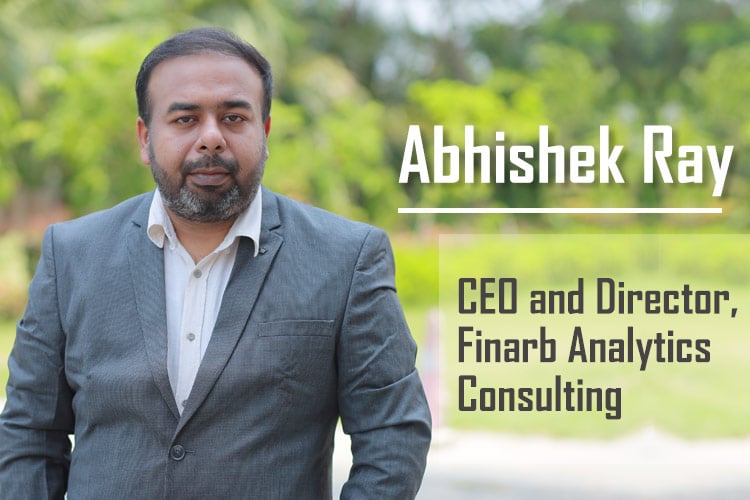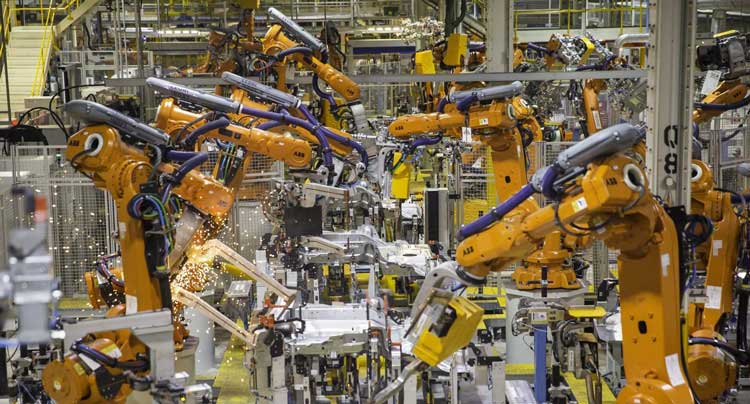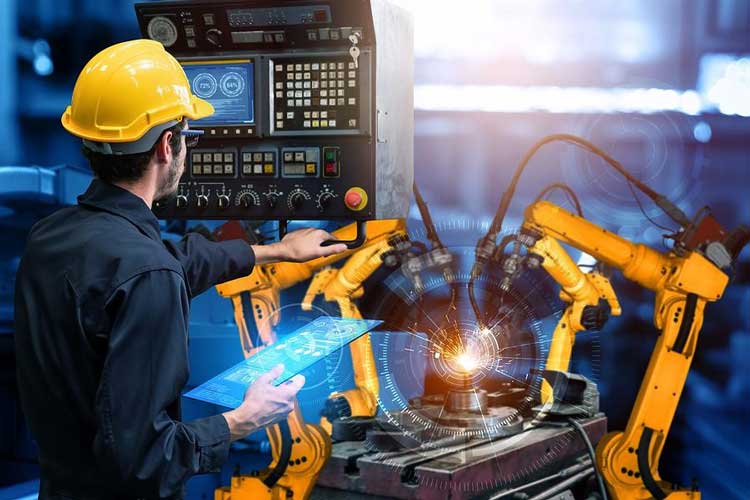
As the decision makers and international industries are facing numerous hurdles, there is a need of the hour to transform manufacturing with the assistance of the most sophisticated technologies. The industries need to revamp and restructure their industrial assets (software or hardware) and obviously control systems. The global management consulting firm McKinsey & Company mentioned that with the help of Fourth Industrial Revolution (4IR) technologies such as machine learning, automation, advanced and predictive analytics, and IoT (Internet of Things), the facilities can be properly supervised by the manufacturers in real-time. In the manufacturing ecosystem, AI has the potential to augment to $16.7 billion by 2026 from $1.1 billion in 2020, a staggering CAGR of 57 percent. To understand the current role of AI in industrial manufacturing, we spoke to Abhishek Ray, CEO and Director, Finarb Analytics Consulting who highlighted how India is transforming its manufacturing landscape, what the country needs to do to increase the role of AI and other key technologies in manufacturing, the upcoming technologies to dominate industrial manufacturing, and various other aspects.
Q. In the industry 4.0, manufacturing is becoming automated where AI and IoT is also playing an important role in this revolution. In India, where do you think this transformation has reached? Also highlight the current challenges in deploying AI in Industrial manufacturing in India.
In India, Industry 4.0 is maturing as a concept gradually. Since 2017/18 onwards, we have seen massive investments being made to make the Indian manufacturing sector more digitized in alignment with the “Make in India” initiative of the current Government. According to a report from NASSCOM, countries like India, China, Brazil, and the US are reported to be spending $100 Billion in Industry 4.0 by 2025. If we talk about the domains that are seeing widespread adoption of Industry 4.0 in India, that would be in automotives for assembly line automation, quality control, and predictive maintenance. Moreover, the adoption can be witnessed also in semiconductors and high-tech industries in the space of quality assurance, supply chain and optimization, and maintenance of critical equipment.
That being said, it is important to understand that the pace of adoption varies significantly across different clusters. Close to 40 percent of Indian manufacturing comprises of MSME’s (micro small and medium enterprises) therefore, adoption of Industry 4.0 would be slower in this cluster simply because these MSME’s sometimes lack the vision, the scale and the immediate funding to integrate digital technologies. And not just that, the effectiveness of Industry 4.0 is a culmination of several factors – robust and reliable digital infrastructure which might be inadequate in certain sections of MSME’s, skilled workforce trained on advanced technologies which remains a challenge not just within MSME’s but wider, and in fact this is a global challenge; we need to be cognizant of these barriers and work towards creating a mindset shift towards embracing new technologies to bring in the next revolution in the Indian manufacturing sector.
Q. As an entrepreneur, what do you think India needs to do to increase the role of AI and other key technologies in manufacturing? Also, how Finarb has been collaborating with the manufacturing industry in driving sustainable growth?
The Indian or even the global manufacturing industry continues to be plagued by economic and geo-political shockwaves. And such variables will continue to affect the productivity and profitability of this industry. Manufacturers therefore need to realize that building a resilient enterprise that can withstand and be prepared for such pressures is the key here. Traditional methods and technologies will no longer suffice. Digitizing their facilities and adopting Industry 4.0 is the way to go and AI is at the heart of it. Despite knowing the value AI can bring, companies struggle with their AI ambitions because there is often a disconnect or lack of understanding where AI could have the maximum impact. Also they don’t seem to have a company wide AI strategy in place, and lack of a data governance framework with fragmented and siloed data can severely limit AI effectiveness.
At Finarb, we have identified these gaps while speaking to industry leaders in India and globally and we approach AI projects very methodically. As a consult-to-operate firm, we approach AI projects starting with a discovery workshop with business and IT heads of our clients to identify and pinpoint the core business objectives or business KPI”s that need improvement. This is translated to the data and AI solutions that will bring the best benefits and KPI improvements for the organization. In cases, where the data is not organized, we propose a complete and secure data warehousing exercise to create a seamless data workflow followed by AI models applied on top of it. This is followed by rapid prototyping to transform ideas into functional prototypes swiftly followed by implementation at scale. Post implementation, we continuously evaluate and refine the model's performance to improve its scalability, accuracy, and efficiency.

Q. Kindly elucidate the various AI solutions you are catering to the industry and what are some of the key solutions you are planning to unleash in the coming months?
For the manufacturing sector, we have been collaborating with our clients mostly on AI use cases in the following areas:
-
Predictive maintenance – in aspects of anomaly/fault detection of machines & equipment, predicting outage and downtime – F1 score of our predictive models is close to 0.7, higher than industry benchmark.
-
We predict Remaining Useful Life (RUL) of critical machines - by analyzing historical performance, sensor readings, maintenance record, learning sequential features from raw sensory data, and applying various deep learning approaches for RUL inference
-
Our AI recommendations also include proactive service dispatch planning based on severity of the identified equipment fault. This allows for more planned inspections and repairs, reduced emergency servicing leading to optimal resource and budget allocations
-
For our clients in the manufacturing sector, we have deployed AI models integrated with predictive maintenance data, for parts optimization, to accurately predict optimal timing for part replacements.
We are developing applications for generative AI in product design optimization - by feeding in various performance objectives. Our AI models are being trained to generate multiple design iterations that meet the desired criteria, improving efficiency and reducing costs. We are also working on solutions for AI aided factory floor safety which is a non-invasive way of monitoring factory floor artifacts, equipment safety or for effective PPE detection. Enhancing simulation powers of Digital Twins using AI is our 3rd incubated solution for manufacturing.
Q. The government of India has unleashed various schemes and incentive packages to boost manufacturing, but do you think it is sufficient to boost the growth and role of technology in the country? Do you wish to highlight anything specific to the government?
The Indian Government is making great strides in regulating and supporting the adoption of AI and Industry 4.0 at large to make the Indian manufacturing sector a level playing field vis-à-vis the world. We are well aware of the Production Linked Incentive (PLI) scheme initiated in 2020 to incentivize companies especially MSME’s to adopt smart manufacturing practices. Additionally the Ministry of Electronics and Information Technology (MeitY), also bodies like NASSCOM, DRDO have created AI Centre of Excellence (CoE’s) focused on active R&D on applied AI use cases and building an AI roadmap for India.
NITI Ayog, which is the public policy think tank arm of the Indian Government has made significant progress in building the importance of AI across industries. Starting from their research publications dating back to 2018, also more recently in 2021, they have highlighted the potential applications of AI in solving societal & business challenges in agriculture, health, smart cities and factories, education, and smart mobility. The organization is also working on creating broad guidelines, principles and conducive regulations for the development and implementation of AI in the country.
Q. When was Finarb founded and what is the reason behind its formation? What is your current mission and vision?
Finarb was founded in 2018 with the objective of solving real-world business problems using AI and advanced data analytics. Our vision is to "Create Impact through AI", harnessing the power of data and intelligence to drive business evolution and promote environmental and societal good. We take pride in our people, some of the best minds in data science, statistical & mathematical modeling, DevOps and industry consultants from ivy league universities. And it’s because of our people and team that in a short span of time, we can boast of a strong clientele including brands like P&G, Parata Systems (part of Becton Dickinson), CPS LLC, BMW, TEVA Pharmaceuticals among others. Our long term relationship with our clients is a testament to the value and impact we bring through our solutions.
We believe in co-creation with our clients rather than just deploying an AI-ML model; our approach begins with problem identification, strategic consulting, rapid prototyping, MVP development, end-to-end deployment and management. It is because of our involvement in the project at the grassroots, a design thinking approach, and our capability in crafting tailored Data & AI solutions that we have delivered extraordinary results in AI model accuracy, surpassing industry benchmarks. This has eventually led to 4 patents we have filed for our proprietary AI models & methodologies.

Q. What is your current growth rate and how much growth are you expecting in the coming FY? With the onset of COVID-19, various businesses have changed their business models and in this regard, what are your current business strategies that are helping you stay ahead of the competition curve?
We have been growing 90 percent YOY and most of this growth can be attributed to the significant expansion of our client base, with a focus on key sectors such as healthcare, BFSI, and manufacturing. These industries have emerged as the largest spenders in AI, recognizing the value of our solutions in driving innovation and operational excellence. Our employee strength has also grown close to 40% over last year. This growth reflects our commitment to nurturing a highly skilled team of professionals capable of delivering cutting-edge AI and data analytics services to our clients.
It is our expertise at the crossroads of data science, statistical modeling, deep industry knowledge of specific challenges/regulations/nuances, and strong DevOps that enables us to develop tailored solutions addressing unique needs of clients, giving them a competitive advantage. We have consistently delivered impact through AI – with accurate understanding of the business challenge, translating that into data driven solutions. Our AI ML models have consistently shown high accuracy to the tune of 98% - 99% in some of our projects like in predictive maintenance or vision enabled quality check. In most of our projects we integrate Machine Learning Operations (MLOps): deployment of Continuous integration, delivery and deployment (CI/CD) practices including monitoring, and stringent governance of ML models, and automated model retraining for scalability. Our CoE doubles up as our Incubation Center with dedicated R&D initiatives to stay at the forefront of the rapidly evolving AI/ML industry. Most importantly, we deliver seamless integration and operation of AI-driven technologies within our clients' existing systems to ensure smooth functioning and scalability in future.
Q. Going forward, highlight the role of Finarb within manufacturing.
As an Indian homegrown company, all of us at Finarb are proud of and firmly support the “Make in India” campaign by the Government of India and its initiatives towards digitizing manufacturing. We aim to work towards creating more awareness about the benefits of AI in manufacturing and work in collaboration with the industry to develop newer applications of AI in furthering rapid innovation, enhancing process optimization & productivity and driving sustainable growth to make India a leading global manufacturing hub!

